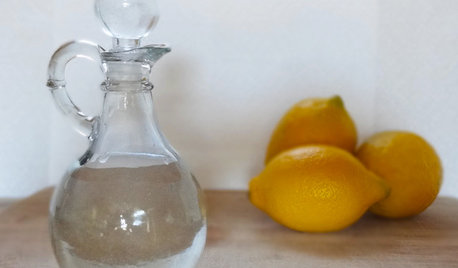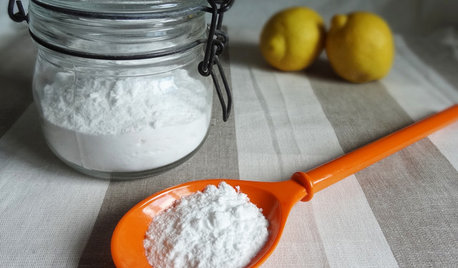Apply Cider Vinegar - Why?
gailozarks
21 years ago
Related Stories

HOUSEKEEPINGVinegar and Voilà: Clean Your House the Natural Way
Ditch the commercial cleaners for nontoxic, inexpensive and versatile white vinegar
Full Story
GREAT HOME PROJECTSHow to Refinish a Wood Deck
Keep your deck looking its best — and save feet from splinters — by applying a new stain and sealant every year or so
Full Story
HOUSEKEEPINGBaking Soda: The Amazing All-Natural Cleanser You Already Own
Battle grime, banish odors and freshen clothes with this common nontoxic cupboard staple
Full Story
COLOR10 Great Places for Rich Fall Colors Year-Round
Use nature’s burgundies, golds and oranges in these select spots for a comforting feel no matter what the season
Full Story
HOUSEKEEPINGThe Best Way to Get Your Windows Spotlessly Clean
Learn the pros’ tips and tricks for cleaning windows and getting them streak-free
Full Story
HOUSEKEEPINGGet Those Carpet Stains Out: Best Nontoxic Methods for Spot Cleaning
Banish blotches the safe way with pantry staples, to get your rugs looking as clean as the day they came home
Full Story
KITCHEN DESIGN9 Molding Types to Raise the Bar on Your Kitchen Cabinetry
Customize your kitchen cabinets the affordable way with crown, edge or other kinds of molding
Full Story
MOST POPULARHow to Get Rid of Those Pesky Summer Fruit Flies
Learn what fruit flies are, how to prevent them and how to get rid of them in your home
Full Story
MOST POPULAR33 Magic Household Cleaning Tips
Houzzers from around the world share their tips for transforming housework into child’s play
Full Story
HOUSEKEEPINGTackle Big Messes Better With a Sparkling-Clean Dishwasher
You might think it’s self-cleaning, but your dishwasher needs regular upkeep to keep it working hard for you
Full StorySponsored
More Discussions



rusty_blackhaw
snoggerboy
Related Discussions
Jock itch and Apple Cider Vinegar
Q
Cider Vinegar for weight loss?
Q
Is my cider turning to vinegar?
Q
apple cider vinegar and plain vinegar
Q
aclott
rusty_blackhaw
rusty_blackhaw
Rosemarino
rusty_blackhaw
decolady01
rusty_blackhaw
shaelee
oakleif
rusty_blackhaw
alicia_2007
lucy
alicia_2007
buffburd
rusty_blackhaw
xamia
rusty_blackhaw
lorna-organic
rusty_blackhaw
grumples_gmail_com
apollog
rusty_blackhaw
apollog
rusty_blackhaw
apollog
lorna-organic
rusty_blackhaw
apollog
rusty_blackhaw
lorna-organic
rusty_blackhaw
lorna-organic
rusty_blackhaw
celcius
celcius
rusty_blackhaw
oakleif
zzackey
rusty_blackhaw
zzackey
BR549dawn
dlmbrt
kk1515
LazyLassie
rusty_blackhaw
theherbalist2012
rusty_blackhaw
theherbalist2012